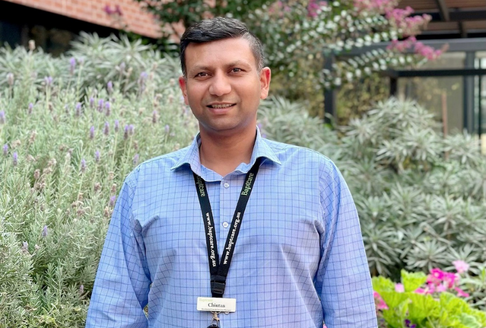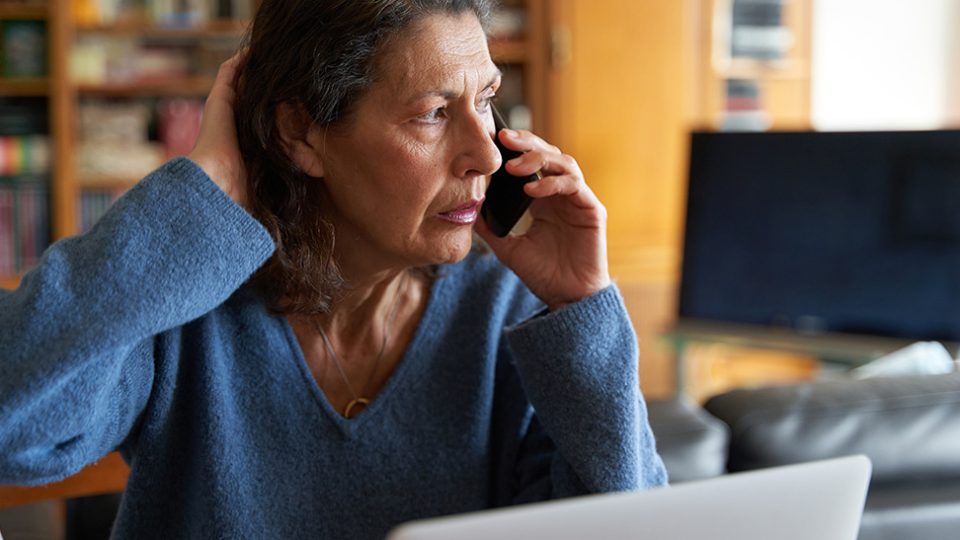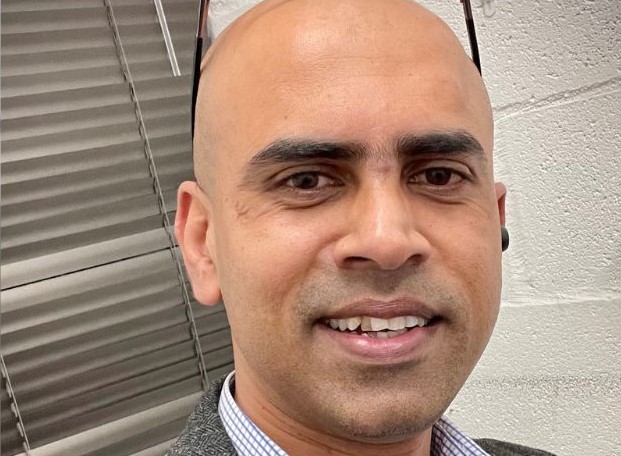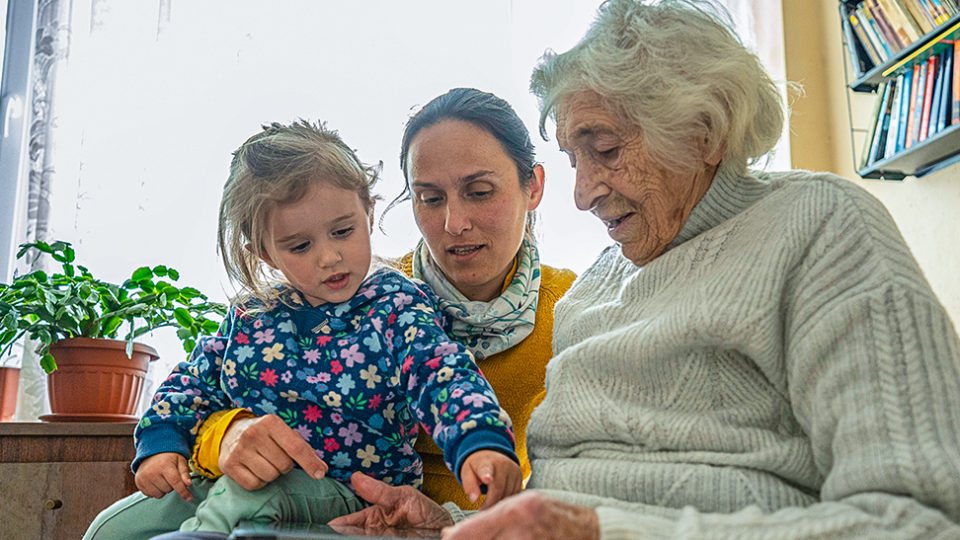Faces of Baptcare #37 | Meet Chintan Patel, Resident Care and Services Manager at The Orchards Aged Care Community
- 28 Mar 2023

What does a typical work week look like for you?
I have responsibility for maintaining the quality of our service and smooth functioning of our community. I do a lot of planning, implementing improvements and observing what is going on day to day.
I think that’s the essence of being a good leader – what you do has a lot more impact on people than what you say. You must deliver.
There’s usually a list of things I’m working through daily, for example, roster management, staff questions/people management, resident and relative queries, risk assessment, etc. There are certain targets and deadlines I need to keep to. It’s important to prioritise matters, attend to things and resolve them each week to ensure we continue to deliver a safe and effective service which maintains and improves the quality of care to our residents. The main goal is to ensure our residents have a safe and healthy environment to live in.
To me, it’s not just about exceeding quality standards, it’s also about providing consistent care each day and constantly looking for continuous improvement across everything we do.
Is there any special training required to become a Resident Care and Services Manager (RCSM) in the aged care sector?
In my case, I am a Registered Nurse. I started my professional journey in the health sector in 2007 and then moved to aged care where I worked in various support services and quality roles before moving to an operations role. I have worked in not-for-profit organisations as well as ASX-listed aged care providers. I joined Baptcare as a RCSM in October 2022 and feel great to be part of The Orchards Community.
What kind of ‘soft skills’ are required to be successful as a RCSM?
Working as a RCSM is a highly rewarding leadership role requiring compassion, passion, experience and exceptional decision-making skills. You must understand that the decisions and actions you take have a direct impact on the lives of people around you.
I see you have a Masters in Biotechnology – tell me more about that.
Maths and Science have been my favourite subjects since school. After completing secondary school, I studied for a Bachelor of Pharmacy and then a Masters in Biotechnology. At university, I did research on cryopreservation techniques and wrote a thesis on “cryopreservation of garlic germplasm utilising vitrification method and plant vitrification solution 3”. I’m happy to say, the result was excellent and demonstrated that it is commercially feasible and there’s a possibility for regeneration of virus free garlic.
Why do you like working in aged care?
I’ve been working in health and aged care for more than 15 years now and have enjoyed every role and never wanted to look for any other career options. I feel very satisfied when I make positive changes in the lives of older people in our care and their families. I always want to make sure residents have the freedom to do what they want wherever possible and enjoy staying with us.
I really strive to create a homely environment as much as I can because this is our residents’ home . I know I’ll continue to work in this sector because I enjoy helping vulnerable people in our community.
What was your first job?
My first job was working in Customer Assistance at Woolworths. I learned how to use my people skills and empathise to understand the feelings of some very frustrated customers so I could respond positively to any problems and build good relationships with them. It was a great opportunity to gain experience about customer service and communication.
Your Baptcare colleagues sing your praises and have commented on how they feel inspired by your kindness, dedication to our residents and leadership skills. What keeps you motivated and how do you keep others motivated?
The most important things motivating me are the smiles and sense of reassurance I see on the faces of our residents and staff. Building trust is so important – you need to prove your presence by making positive changes with visible improvements to allow people to start building their trust in you.
All challenges and complaints are welcome – they are opportunities for improvement. My hunger to find solutions keeps me motivated.
Similarly, staff need acknowledgement to stay motivated and feel inspired every day. I always make sure that hard work and extra effort are acknowledged, and everyone feels like a valued member of the team. I try to walk around The Orchards Community to meet staff on the floor, say hello and acknowledge their presence at work.
I talk about opportunities for further development and growth and give staff the space they need to thrive. I always make sure they are happy and feel supported at work and that the workplace environment is safe and relaxing. That way, everyone feels happy and ready to come back on their next shift.
What do you like to do in your spare time?
In my free time, I love to go for a walk and connect with nature. It helps me to relax my mind and body and I feel healthy and more energetic. Sometimes, I plan a walk with my friends so that we can have meaningful discussions – it helps me to think outside the box. I also enjoy spending time with my family, playing indoor and outdoor games with the kids – and answering their endless questions!
Thank you Chintan, for your relentless pursuit of service excellence at The Orchards. We are truly grateful for everything that you and your team do to help our residents live their best lives.
Community news
-

Tips for dealing with life in the sandwich generation
This is part two in our blog series on the sandwich generation. Here are some tips for dealing with the carer’s squeeze experienced by a growing number of Australians, particularly women. Key points: Summary of challenges facing the sandwich generation Tips for dealing with the challenges System reforms needed
- 11 Jul 2025
-

Meet Suraj | Hospitality Manager Residential Aged Care
What makes a residential aged care community truly feel like home? It’s the perfect blend of a warm, inviting atmosphere, devoted and compassionate staff, and thoughtfully crafted meals that foster an undeniable sense of belonging. Today we meet Suraj Ligade, Baptcare’s Hospitality Manager, to explore how his passion for care and culinary excellence nourishes both the bodies and spirits of our treasured aged care residents.
- 10 Jul 2025
-

The sandwich generation phenomenon unpacked
Welcome to the first of two blogs on the theme of the sandwich generation in Australia. In this one, we’ll cover the definition of the sandwich generation, the different types of caring that fall within it and some of the issues those in the sandwich generation face. The second blog will cover tips for dealing with life in the sandwich generation
- 02 Jul 2025
